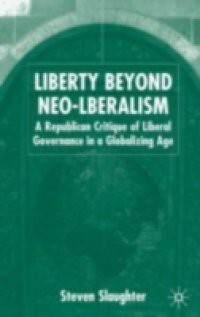Steven Slaughter examines whether liberals can govern in a way that promotes liberty and moderates the rising social dislocation associated with economic globalization. The book evaluates the potential of various liberal arguments to attend to the harmful social aspects of economic globalization in three distinct stages. First, it examines the nature of economic globalization and the consequences of this process for liberal thought and governance. Second, it examines contemporary liberal approaches by critically examining a series of liberal texts that provide alternative schemes of governance. Third, in finding these contemporary liberal arguments insufficient to the task of a socially responsible regulation of economic globalization, the book concludes with an innovative scheme that stems from neo-roman republican political theory. This alternate approach is termed global civic republicanism and seeks to retrieve the public and civic character of the state in order to provide protection from economic vulnerability so as to constitute a resilient form of liberty. As such, the practical and scholarly resources that support the idea of the civic state are outlined and the legacy of republican ideas in world politics and the global context of association required for civic states to be possible are also examined. The aim of global civic republicanism is the republican inspired goal of non-domination in respect to the social impact of economic globalization.

